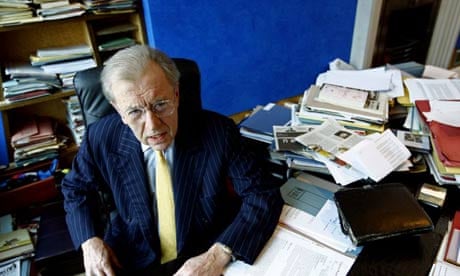In November 1962, when I was recently down from Cambridge, I landed the graduate's dream job, devising and hosting a show on BBC Television. It was called That Was the Week That Was, the ground-breaking programme that opened a new chapter in political satire.
It was almost literally an overnight success. In fact, so popular was the show that one mum wrote to me asking what she could do to ensure that her new-born son grew up to be a satirist.
If she had asked me that question today, I could have recommended the new documentary, Frost on Satire (BBC4, 9pm, Thursday). In it I talk to master satirists, from both sides of the Atlantic, to try to answer some of the questions I still get asked after a lifetime spent working with the troops on the satirical front line. For instance:
I want to become a TV satirist. Will I need a sense of humour?
Broadly, yes. Let's just say, in my experience, it's never a hindrance. From my first day at the BBC, I could see that my Cambridge Footlights-honed sense of humour was going to stand me in good stead.
So can you remember any of the jokes from any of the early episodes of That Was the Week That Was?
I remember clearly ending the third programme with this cod news item: "During the week, Mr Maudling, the chancellor of the exchequer, held a meeting with the unemployed at the end of which he got up and said, 'Well, I don't know about you but I've got work to do…'."
I also recall that, by the end of the evening, 987 calls had been logged by the BBC, 544 of which were complimentary – a crucial lead in public opinion for the satirists over the satirised.
How soon before I can start making people laugh?
It can happen almost immediately. But most satirists want something more: they want to change the world – and that normally takes a bit longer. If at all.
Because not all satirists think what they do can change the world. John Lloyd, one of the creators of the long-running Spitting Image, told me that satire "may change perceptions but it doesn't actually change the actuality". He said: "When I left Spitting Image after the first four years I certainly felt that we'd achieved nothing but possibly make the government slightly more powerful than it was when we'd found it."
Isn't that a bit disheartening?
It depends. Others, especially in America, think differently. The comedian Chris Rock remembers people saying that, back in 1960: "Kennedy didn't beat Nixon, satire beat Nixon."
James Downey is a veteran Saturday Night Live writer. He says: "Satire has a role in the democratic process. The right sketch can be worth more than 1,000 words in Foreign Affairs Quarterly."
Downey – who has written political sketches for 27 of SNL's 35 seasons – acknowledges that such comedy can have a resonance, especially if it comes from several people. "I have to believe when Jon Stewart and Stephen Colbert and Bill Maher each do their own take," he says, "there is a cumulative effect."
So what happened to British TV satire, red in tooth and claw?
It ran out of steam in the 1990s. Satire needs targets and the plight of the Spitting Image team reflected a nationwide crisis in comedy.
Their key target – Margaret Thatcher – resigned and the satire boom burst audibly. A whole generation of British satirists lost their target – and with it their raison d'etre. The streets of Soho teemed with desperate comedians. The market crashed. You could buy a dozen satirical barbs in Wardour Street for as little as 50p. Ironically, in the mean time, a satirical boom was being born in America. As Thatcher stepped down here, the George W Bush administration – the gift that keeps on giving – dropped into the laps of US funnymen.
So is there a future for television satire?
The answer is that we just don't know. In America there's no doubt, the future's already here – and it's booming. Jon Stewart's Daily Show is setting the news agenda four nights a week, that enduring old war horse Saturday Night Live is still making headlines and the late night comics like David Letterman, Jay Leno and Jimmy Fallon keep up a constant comic commentary. Take Leno last week on the Gulf oil spill: "It's amazing to me, the new unemployment figures are not good. A lot of people out of work, yet somehow the CEO of British Petroleum still manages to keep his job."
And breathing down the necks of the established late night hosts are the new kids on the block, the internet satire sources such as YouTube, Funny or Die and CollegeHumor.
By comparison British satire looks quiescent – though no one watching some episodes of BBC2's Mock the Week could ever accuse it of not still being red in tooth and claw.
What we need is a comedy coalition to monitor our so-called "new politics". I'm optimistic. I still believe in the power of British satire to make us laugh while making the world a better place. The new government knows what it must do. Satirists need targets and there are already signs that the coalition recognises that it has a duty to provide them.
At a time of rising unemployment it must ensure that there are job opportunities galore for novice satirists. And to help them, there are plenty of veteran satirists who are ready to share their hard-won knowledge of the trade. Another golden age beckons: for the sake of our children – and our children's children – let's make it happen!
Is that it?
Yes.









Comments (…)
Sign in or create your Guardian account to join the discussion